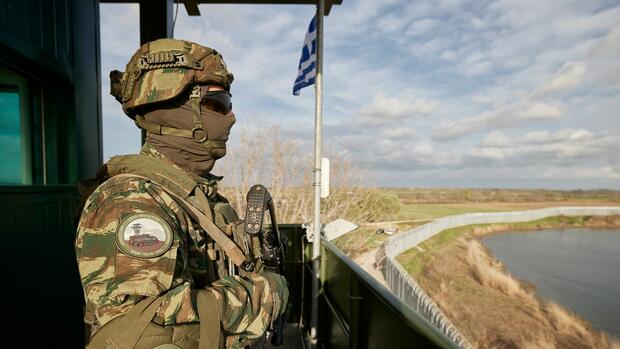Relations between neighbors have been marked by conflicts in the past.
(Photo: dpa)
Ankara, Athens When the defense ministers of two NATO countries meet, it’s usually not big news. In this case yes, because it is Greece and Turkey. The meeting between Nikos Panagiotopoulos and Hulusi Akar is being watched closely in Washington, by NATO and the EU. Because the rapprochement between Athens and Ankara is a significant foreign policy change of course by Turkish President Recep Tayyip Erdogan.
The ministerial meeting will take place in Hatay in south-eastern Turkey. In early February, more than 50,000 people died in the devastating earthquakes in the region. Greece was one of the first nations to send rescue teams and relief supplies on the day of the disaster. “Efharisto poli file” was the headline in the pro-government Turkish newspaper “Hürriyet” in Greek, “Thank you, friends”.
Just a few weeks ago, Erdogan threatened rocket attacks on Athens. Now he sent surprising diplomatic greetings for the Greek national holiday on March 25 and promised “efforts to cooperate and develop our relations”.
Erdogan does not just leave it at friendly words. While Turkish military pilots have been flying low over Greek Aegean islands several times a week for years, there was not a single such overflight in February and March – compared to 234 in the previous year. “The relaxation is remarkable,” says Greek Defense Minister Panagiotopoulos.
The rapprochement with Athens is part of the Turkish opening to the west. Since the beginning of March, the government in Ankara has been implementing parts of the western sanctions against Russia in which it had previously not participated. Russian airlines that fly American aircraft types such as Boeing and are therefore also subject to the sanctions may soon no longer be able to land at Turkish airports.
Erdogan is courting help from the EU and the USA
The approval of Finland’s entry into NATO is also one of the steps taken by President Erdogan that the West should like. After months of negotiations, the Turkish parliament voted in favor of the Scandinavian country joining at the end of last week.
Erdogan’s motives for this turnaround could be related to a reassessment of the geopolitical situation. At the beginning of the war, Turkey was able to benefit from its neutral stance as a broker between the West on the one hand and Russia on the other, threading agreements such as the grain deal and, quite incidentally, also benefiting enormously economically. Trade with Russia had tripled since the war began, also because of increased prices.
The United States had repeatedly threatened to impose sanctions on Turkish companies if these sanctions against Russia were circumvented. In one of its sanctions packages against Russia, the EU had also threatened secondary sanctions against companies that circumvent EU requirements.
The longer the war lasted, the more difficult Erdogan’s tightrope walk became. Most of its most important political and economic partners lie west of Türkiye. He needs political support from the West if he wants to win the presidential race in May’s elections.
>> Read more: Earthquake, inflation, weak exports – the Turkish economy is reeling
And Erdogan also needs the help of the West to rebuild after the earthquake disaster. The damage amounts to around 100 billion euros. Turkey cannot handle the reconstruction alone.
In addition, Erdogan wants new fighter jets from the USA and an expanded customs agreement from the EU. Both would be good news for him in the election campaign – but without the abandonment of trade with Russia and a rapprochement with Greece.
Greek Migration Minister Mitarakis is traveling with Panagiotopoulos to the disaster area in south-eastern Turkey on Tuesday. There he meets the Turkish Interior Minister Süleyman Soylu. The issue of migration and the different interpretations of the EU refugee agreement have been causing tensions between Athens and Ankara for years. If the ministerial meeting gives rise to a starting point for better implementation of the refugee deal, that would also be a breakthrough for the EU.
How viable the rapprochement between Athens and Ankara is will only become apparent in the second half of the year. First of all, there will be elections in both countries: on May 14 in Turkey and a week later in Greece. Then the cards are reshuffled in relation to the two difficult neighbors.
More: The Turkish lira is suddenly too strong – and causes losses on the Istanbul stock exchange
